The McGillicuddy Book of Personal Records by Colleen Sydor
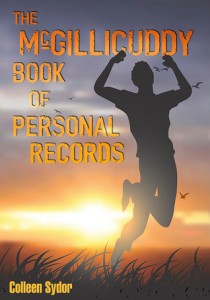 Summary: Obsessed with breaking a world record, Lee McGillicuddy makes attempts on several different records unsuccessfully. After the latest attempt gives him sunstroke, Lee remains more determined than ever, forcing himself to walk the Manitoba Marathon, a thirty-five kilometre journey. Despite his failures, Lee is hopeful, until he comes to the abrupt realisation that some people are born talented as opposed to having to work to put their names in the record books. He becomes discouraged, but encouragement from his friend Rhonda (call me Ron) ends up leading to a situation that will test his endurance and prove the character traits he possesses are record-breaking in their own right.
Summary: Obsessed with breaking a world record, Lee McGillicuddy makes attempts on several different records unsuccessfully. After the latest attempt gives him sunstroke, Lee remains more determined than ever, forcing himself to walk the Manitoba Marathon, a thirty-five kilometre journey. Despite his failures, Lee is hopeful, until he comes to the abrupt realisation that some people are born talented as opposed to having to work to put their names in the record books. He becomes discouraged, but encouragement from his friend Rhonda (call me Ron) ends up leading to a situation that will test his endurance and prove the character traits he possesses are record-breaking in their own right.
Number of Pages: 212
Age Range: 11-13
Review: With shades of a PG version of A Prayer of Owen Meany by John Irving, The McGillicuddy Book of Personal Records by Colleen Sydor features Lee McGillicuddy, a teen who stumbles upon heroism after training to break a world record. Lee is determined to conquer his body and in the process demonstrates characteristics of strength, single-mindedness and perseverance. Though he does not achieve his goal of making a world record, he saves the life of his friend Rhonda instead, making a name for himself as a hero and proving his fortitude.
Constantly seeking to improve himself, Lee collects quotes to motivate him and help him figure out the nature of life. He comes to see himself as the star of his own movie, being directed from above, though at first he sees it as a pretty boring tale. Except even before he saved Rhonda, he was always the hero of his own story by being a great kid.
The voice of Santiago, Lee’s dog, was for me the best part of the book. It’s authentic, funny and endearing, and I loved how Santiago plays such a crucial role in Lee’s life as his friend and companion. Sydor truly captures his innocence and continual enthusiasm as he blossoms under just a bit of attention. Great character.
Sydor’s book lies at the very edge of teen, probably better suited for pre-teen, but Lee himself is thirteen. At times I thought he could have been older with his knowledge of The Old Man and the Sea by Ernest Hemingway, but his friendship with Rhonda and infatuation with Charlotte place him firmly in early teens.
Memorable Quotes:
“Far better is it to dare mighty things … than to rank with those poor spirits who neither enjoy much nor suffer much, because they live in a gray twilight that knows not victory nor defeat. – Theodore Roosevelt” – from The McGillicuddy Book of Personal Records by Colleen Sydor, page 67
“There are only two ways to live your life.
One is as though nothing is a miracle.
The other is as though everything is a miracle. – Albert Einstein” – from The McGillicuddy Book of Personal Records by Colleen Sydor, page 73
“Strength does not come from physical capacity.
It comes from an indomitable will. – Mahatma Gandhi” from The McGillicuddy Book of Personal Records by Colleen Sydor, page 181
The McGillicuddy Book of Personal Records by Colleen Sydor is published by Red Deer Press, (2010).
Karma by Cathy Ostlere
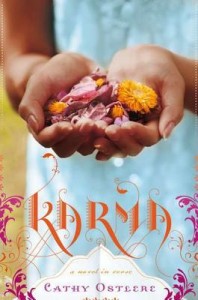 Summary: With one parent who is Sikh and one who is Hindu, Maya (Jiva) is caught in the middle with two names and conflicting beliefs about God and life. As the only Indians living in rural town of Elsinore, Manitoba, the culture isolation hits Maya’s mother the most, leading her into depression and suicide. In response, her father takes Maya back to India, but it’s 1984 and prime minister Indira Gandhi is about to be assassinated, plunging the country into a violent rampage against Sikhs. Maya and her father are separated during the riots, each believing the other is dead, and when Maya witnesses a man being burned alive because he is a Sikh she finds herself unable to speak. Her long journey back to her father is fraught with danger and misunderstandings, but falling in love with her rescuer’s brother, Sandeep, gives Maya a reason to keep going. When Maya and her father do find each other, he is less than thrilled she has fallen in love with a Hindu, except Maya is not the meek girl she was before their trip and is now willing to challenge him on his beliefs.
Summary: With one parent who is Sikh and one who is Hindu, Maya (Jiva) is caught in the middle with two names and conflicting beliefs about God and life. As the only Indians living in rural town of Elsinore, Manitoba, the culture isolation hits Maya’s mother the most, leading her into depression and suicide. In response, her father takes Maya back to India, but it’s 1984 and prime minister Indira Gandhi is about to be assassinated, plunging the country into a violent rampage against Sikhs. Maya and her father are separated during the riots, each believing the other is dead, and when Maya witnesses a man being burned alive because he is a Sikh she finds herself unable to speak. Her long journey back to her father is fraught with danger and misunderstandings, but falling in love with her rescuer’s brother, Sandeep, gives Maya a reason to keep going. When Maya and her father do find each other, he is less than thrilled she has fallen in love with a Hindu, except Maya is not the meek girl she was before their trip and is now willing to challenge him on his beliefs.
Number of Pages: 517
Age Range: 15-17
Review: Exploring Indian society during a bit of the same time period as A Fine Balance by Rohinton Mistry, Karma by Cathy Ostlere combines historical fiction with romance, resulting in a story that gives teen insight into India’s tumultuous past.
I love the historical aspect and the contrasting worlds for Maya as she goes from Canada to India, feeling like a foreigner in both places. Love helps her feel like she has a place to belong, but her father is determined she should not make the same mistakes he did by marrying outside his religion. What Maya’s father fails to realise though is that Maya is not simply Hindu or Sikh; she is both. And the environment she was raised in will inform her decisions about who she falls in love with.
What I found most intriguing about Ostlere’s tale is that Maya’s upbringing gives her a unique perspective on India’s conflict. Because she is both Sikh and Hindu she is also both aggressor and victim, and her insight into the situation is personal and powerful. Will Maya and Sandeep’s love ultimately overcome all obstacles? I’m not sure, but I know either way Maya is a stronger, more genuine person who is now able to stand up to her father. Though her mother is dead, Maya still seems to have her guidance in her heart and mind.
Karma is written in a free verse poetry format, which gives the story a lighter, romantic and mythical quality. In the end the historical part fades away as the story becomes about romance instead. The transition between Maya’s and Sandeep’s stories was a bit jarring for me, and because of the font choice I thought the last section said Fiva’s Journal instead of Jiva’s. I spent some time wondering who Fiva was until I remembered the same thing happened to me the first time I read Karma as well.
It’s a good pick for female mid teen readers as they will learn but ultimately be captured by the romance.
Memorable Quotes:
“‘And besides, there’s nothing we can do, Jiva.
Perhaps they’ll do better in their next life.’
But I think he means they should have
done better in their last.
Karma.” – Conversation between Maya and her dad from Karma by Cathy Ostlere, page 50
“When she storms off, Barindra takes me aside.
‘Don’t worry, Sandeep. Families aren’t supposed to
be peaceful. Good families are like steel. Stronger
when heated. Then They can withstand anything.’
Well, if this keeps up, the house could go up in
flames while we’re sleeping and none of us would
have a blister.” – Conversation between Barindra and Sandeep from Karma by Cathy Ostlere, page 190
“‘No. I cannot agree. Murder is
never justified. Just as it’s not
right to look the other way
while someone else does it.
God grants us life. It’s our
duty to protect it. For every
living being.’
‘And at what cost, Barindra?’
‘At risk to ourselves, when
necessary, Mina. If not, our
gestures are empty.'” – Conversation between Barindra and Mina from Karma by Cathy Ostlere, page 240
“He gave me a fountain pen too!
No need to press hard
and raise the print through
to the other side.
The slitted nib will draw
words out easily.
Liquid thoughts.
Swelling letters.
A river of ink flowing
black and wet.
Flooding the paper banks.” – Maya from Karma by Cathy Ostlere, pages 351-352
“I kneel down and touch Mata’s
sari to my father’s feet.
I finally understand: ‘To love each
other is also to love the Divine.'” – Maya from Karma by Cathy Ostlere, page 500
“We cannot see how our lives will unfold.
What is destiny and what is accident?
And how can one ever be certain?’ – Maya from Karma by Cathy Ostlere, page 514
Karma by Cathy Ostlere is published by Puffin Canada, (2011).
Sworn Enemies by Carol Matas
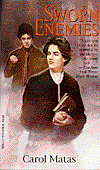 Summary: In the 1800s, the Czar of Russia plans to convert Jews by forcing them to enlist in the army. Each community has a quota to fill, and those who are reluctant to give up their boys to the military find they can be kidnapped by khappers; men hired to force them to do their twenty-five years of service. If families can afford to pay, their sons will be safe, but Zev, a khapper, has a personal vendetta against Aaron, a scholar, and abducts him anyway. Suddenly, Aaron’s bright future of discussing the Torah and marrying Miriam, the love of his life, becomes a future of having to give up his beliefs just to survive with a chance of being able to pursue his dreams again in twenty-seven years. Meanwhile, Aaron’s angry family causes Zev to leave town, and in an unexpected twist to his initial glee he finds himself sharing Aaron’s fate.
Summary: In the 1800s, the Czar of Russia plans to convert Jews by forcing them to enlist in the army. Each community has a quota to fill, and those who are reluctant to give up their boys to the military find they can be kidnapped by khappers; men hired to force them to do their twenty-five years of service. If families can afford to pay, their sons will be safe, but Zev, a khapper, has a personal vendetta against Aaron, a scholar, and abducts him anyway. Suddenly, Aaron’s bright future of discussing the Torah and marrying Miriam, the love of his life, becomes a future of having to give up his beliefs just to survive with a chance of being able to pursue his dreams again in twenty-seven years. Meanwhile, Aaron’s angry family causes Zev to leave town, and in an unexpected twist to his initial glee he finds himself sharing Aaron’s fate.
Number of Pages: 133
Age Range: 12-14
Review: While Sworn Enemies by Carol Matas explores a time in history when Jewish boys and men were forced to fight for a Russia against their will, enduring forced conversions to Christianity if they wanted to live, what I enjoyed most about the book was the dynamic between Zev and Aaron.
The historical aspect is a backdrop to a powerful tale about two teens, one consumed by jealousy and rage, and the other forced to confront his own dark side when he finally faces betrayal and true despair for the first time in his life. Matas’ writing challenges her reader to consider how they would react when faced with traumatic situation beyond their control.
I love the contrast between Zev and Aaron as Zev continually finds ways to blame Aaron for all of his troubles, refusing to see how his actions affect his own life. Aaron, on the other hand, battles his own nature, trying his best not to be consumed by hatred even though he has much to be angry about. Both are confronted with their belief in God, drawing different conclusions about what God would want. For Zev, God is an avenging bully, but for Aaron God is full of understanding and forgiveness. In the end, their differing beliefs seem to inform how they choose to go forward in their lives.
Matas’ story is just 133 pages, and for me it went much too quickly.
Memorable Quotes:
“Now I see how every waking moment will be pure torture for me. How can I eat without washing my hands and saying the prayer? And worse, how could I even dream of eating anything that is not kosher?
What could I do? The soldier is right. I am the czar’s now. Would God want me to break the most basic of all His laws, the laws of kashrut? I stare at the treyf food, forbidden, expressly forbidden by God. It is the spirit of the law that is important, Papa would say. But he would never eat pig. Or eat anything that wasn’t kosher. There is no bending this law, only breaking it. How much do I give up to survive? I know Papa and Mama would want me to live; if they were here they would say, “Eat.” Rabbi Benjamin? I can hear his words: “the law is given for man and not man for the law. The law is to live with and not to die for!” And I think of the teaching of the rabbis—one may do anything at all to preserve life if there is mortal danger, outside of three things and these are forbidden even if one might die. These three things are bloodshed, immorality, and conversion. If I don’t eat I will weaken and die. Perhaps that would be best. No, I cannot give up now. So soon. Perhaps I will be rescued. Perhaps I can escape. I think of Miriam. She would never forgive me if I gave up so easily. And God? What does He want? Is it His will I am here, taking this test?” – Aaron from Sworn Enemies by Carol Matas, page 23
“We march all day without rest. At least ten of the hundred recruits we joined up with fall by the wayside as we march. I imagine that they have been marching for weeks, they look so thin and miserable. And most, of course, are from poor families to begin with so they haven’t the strength or the stamina to carry on. Many are wracked with terrible coughs, and I can see by the shine in their eyes that they are burning with fever.
But I begin to understand, as the night wears on and we have more and more bodies behind, that it is not just physical weakness and disease which is killing these boys. They no longer want to go on. They have been cut off from everything that has meaning for them, taken from love into hate, or at best indifference, and they do not wish to continue. They despair and they die. I look numbly on, helpless to do anything but fight my own despair.” – Aaron from Sworn Enemies by Carol Matas, pages 40-41
“As his back recedes into the milling crowds of people on the deck I feel a huge weight lift from my heart. I do not want to spend the rest of my life filled with hate, rage, and thoughts of revenge. I realize suddenly that he can only ruin my life if I allow him to do so. And I will not. He is a poor soul who must live constantly tortured with dark thoughts. I will not let him turn me into that. It would be his final triumph. I will survive. I’ll see my family again. I’ll see Miriam again. We’ll start fresh in a better place.” – Aaron from Sworn Enemies by Carol Matas, page 131
Sworn Enemies by Carol Matas is published by HarperCollins Publishers, (1993).
After the War by Carol Matas
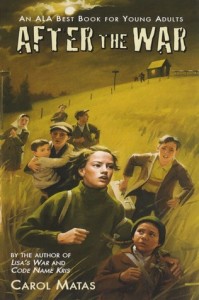 Summary: When World War II ends, Ruth is left to pick up the pieces of her shattered life. As a Jew who survived the Holocaust, Ruth searches for her lost family members among a sea of displaced persons trying to find each other and a new purpose. Israel is the promised land in more ways than one, and Ruth’s motivation to join those on this exodus from Poland comes from being enlisted to the cause as opposed to religious fervour. Along the way, Ruth slowly faces the horrors she has experienced, watching the reactions of others while dealing with her own, searching like everyone else for a place without hatred, where she can finally be safe.
Summary: When World War II ends, Ruth is left to pick up the pieces of her shattered life. As a Jew who survived the Holocaust, Ruth searches for her lost family members among a sea of displaced persons trying to find each other and a new purpose. Israel is the promised land in more ways than one, and Ruth’s motivation to join those on this exodus from Poland comes from being enlisted to the cause as opposed to religious fervour. Along the way, Ruth slowly faces the horrors she has experienced, watching the reactions of others while dealing with her own, searching like everyone else for a place without hatred, where she can finally be safe.
Number of Pages: 138
Age Range: 12-14
Review: In an eye-opening book about life for Jewish people after World War II, Carol Matas explores the roles of sorrow, loss and a thirst for justice in surviving unspeakable times.
What touched me most was a conversation Matas features between Ruth and her friends about God. After all of the terrible injustices they’ve endured, they each have a different perspective on whether he even exists and if he does, why he would allow such things to happen. It’s a profound note to a short but poignant story.
Knowing the history beyond Ruth’s time period was bittersweet because Matas sets up Israel to be everything the Jews are looking for when in fact they are plunged into further hardship and turmoil. The story itself was a learning experience for me, and reading about Ruth’s journey was enjoyable because she was an astute observer. Watching Simon and others react to their experiences by becoming militant and jaded was heart-rending but completely understandable, and I thought Matas did an excellent job of highlighting the resulting actions of various people in the face of loosing everything.
There are so many stories to tell about WWII, and once again I have seen things from another perspective. My interest continues to be piqued with fresh views like Matas’.
Memorable Quotes:
“‘You deserve everything good in the world,’ he murmurs.
I smile.
His eyes open wide. ‘You smiled! I’ve never seen you smile. What did I say!’
‘You’re so funny,’ I whisper. ‘There is no good in the world. You just have no idea!’
He grows angry then. It’s the first time I’ve seen him mad. ‘Don’t tell me I have no idea,’ he says. ‘Don’t tell me that.’
I could kick myself. I don’t know what happened to him and his family but it’s bound to be horrible.
‘I’m sorry,’ I apologize, and I really mean it. ‘Please forgive me.’
He nods but still looks shaken.
‘It’s all right,’ he says. Then he pauses. ‘My pain is no less than yours, Ruth.’
I touch his hand, which is clenched on the bed. ‘I know. I know that.'” – Conversation between Zvi and Ruth from After the War by Carol Matas, pages 66-67
“‘The world understands one thing and one thing only, force. Who’s strong? Who’s weak? If the world sees we are weak, we’ll never get our land. If they see we’re strong, they’ll have to give it to us.'” – Simon from After the War by Carol Matas, page 112
“I spent the rest of the day lying in the tent. People come in and out, sometimes the children jump on my cot and beg for a story but I am wandering inside, wandering through my past, trying to see if there is a place there strong enough to hold me.” – Ruth from After the War by Carol Matas, pages 126-127
After the War by Carol Matas is published by Scholastic Canada, (1996).
Irma Voth by Miriam Toews
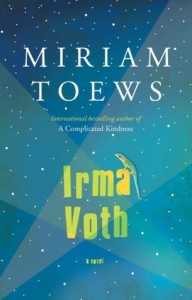 Summary: Living as a Mennonite in Mexico, Irma Voth is a young, married nineteen year-old who lives with her husband on the farm adjacent to her parents’ farm. Her husband, Jorge, is a native Mexican and an outsider to the Mennonite community and when he leaves Irma she doesn’t know what to do with herself. A local filmmaker comes to the farming community with a vision and hires Irma to translate between him and his star actress. As Irma entangles herself with the outsiders, her father’s anger grows, spilling over onto Aggie, her younger sister, until Irma must take action to protect her. But protection comes in the form of going on the run with Aggie and her newborn sister Ximena, forcing Irma out of her somewhat scatterbrained ways into a position of responsibility. As she gains distance from her family of origin, Irma is finally able to face long-held secrets and acknowledge the truth and consequences of her decisions.
Summary: Living as a Mennonite in Mexico, Irma Voth is a young, married nineteen year-old who lives with her husband on the farm adjacent to her parents’ farm. Her husband, Jorge, is a native Mexican and an outsider to the Mennonite community and when he leaves Irma she doesn’t know what to do with herself. A local filmmaker comes to the farming community with a vision and hires Irma to translate between him and his star actress. As Irma entangles herself with the outsiders, her father’s anger grows, spilling over onto Aggie, her younger sister, until Irma must take action to protect her. But protection comes in the form of going on the run with Aggie and her newborn sister Ximena, forcing Irma out of her somewhat scatterbrained ways into a position of responsibility. As she gains distance from her family of origin, Irma is finally able to face long-held secrets and acknowledge the truth and consequences of her decisions.
Number of Pages: 255
Age Range: 17-18
Review: Miriam Toews makes me want to be a better writer.
It’s because she’s subtle. I started out confused by Irma’s actions, wanting her to have some strength and spunk when she often seemed limp and scattered. Toews’ story is one that builds gently and the use of the first person narrative keeps her reader in the dark as things are revealed only when Irma is ready to face them. When the truth of Irma and Aggie’s home life comes to light it’s a revelation except the clues were there all along. Irma herself blossoms once she gets out from her father’s shadow into the sun.
Some might wonder why I consider Irma Voth a teen book but Toews’ story contains a scene I think explains it perfectly. Marijke, the actress, states she is stuck at fourteen because of something traumatic that happened to her and for Irma, though she doesn’t initially realise it, it’s the same. She’s stuck as a teen, under her father’s thumb, even when she falls in love, gets married and moves out. It doesn’t matter that she continues to age because she is stuck in that moment in time until she confronts her memories and decisions. By the end of the book, she is an adult but at the beginning, even at nineteen, she’s still in many ways a child. In that sense it’s a coming-of-age book which is a well-loved teen theme.
There are moments of exquisite writing and stunning character development. While it took me some time to get into Irma’s viewpoint, I ended up respecting her and gaining insight into why she was the way she was. There were little aspects I loved such as Toews’ prophetic name choices: pure Aggie and her painfully honest paintings, as well as Ximena, the listener, who seems to embody the conflict of their parents and even as a baby is a bit of a hell-raiser.
Mostly I just loved the whole story as an observation of the roles of trauma and truth. This review is by no means exhaustive as once again I felt the limitations of reading a book in day. Instead, Irma Voth is a book for my reread list, so I have another chance to catch parts I missed the first time around. I agree with other reviewers that Toews deserves to be considered a classic Canadian writer and I would recommend her book for older teen readers and Canadian Literature courses.
Memorable Quotes:
“With flowers You write, said Wilson,
O giver of Life,
With songs You give colour,
with songs You shade
those who must live on the earth.
Later you will destroy eagles and ocelots;
We live only in Your book of painting,
here, on the earth.” – Wilson from Irma Voth by Miriam Toews, page 93
“Sometimes I feel like my life is an invention, she said.
Well, I said, sometimes the only way I know I’m alive is when I feel pain in my chest, because there’s no pain in heaven.” – Conversation between Marijke and Irma from Irma Voth by Miriam Toews, page 110
“One minute you’re jumping in the sparkly waves for the first time in your life and completely unable to stop laughing and the next you’re shedding the useless lining of your uterus and smearing messages in blood in porcelain bowls and sandy beaches. Words of shame like I’m sorry about this mess and the smell and I don’t know why the hell I’m crying on such a beautiful summer day.” – Irma from Irma Voth by Miriam Toews, pages 156-157
“Really? said Noehmi. Why do you have her?
I don’t know, I said.
Did your parents die? said Noehmi.
No, I said. I was beginning to understand something I couldn’t articulate. It was a jazzy feeling in my chest, a fluttering, a kind of buzzing in my brain. Warmth. Life. The circulation of blood. Sanguinity. I don’t know. I understood the enormous risk of telling the truth, how the telling could result in every level of hell reigning down on you, your skin scorched to the bone and then bone to ash and then nothing but a lingering odour of shame and decomposition, but now I was also beginning to understand the new and alien feeling of taking the risk and having the person on the other end of the telling, the listener, say:
Bad shit at home? You guys are running away?
Yeah, I said.
I understand, said Noehmi.” – Conversation between Noehmi and Irma from Irma Voth by Miriam Toews, page 171
“What do you mean wasted? I asked her. She said they were on another plane. She read something out loud to me from her book: Katherine compared the energy of trauma to a cobalt bomb with a radioactive half-life of one hundred years. I asked her what that meant and she said she didn’t know exactly but that she loved the way it sounded. She thought maybe it meant that every trauma presents a choice: paralysis or the psychic energy to move forward.” – Conversation between Irma and Noehmi from Irma Voth by Miriam Toews, page 175
Irma Voth by Miriam Toews is published by Alfred A. Knopf Canada, (2011).
Juliana and the Medicine Fish by Jake MacDonald
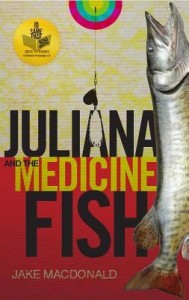 Summary: After Juliana’s parents’ divorce, she moves from the happy life she once had in Kenora, Ontario to Winnipeg, Manitoba with just her mother. It’s hard to get used to her new life, especially when her father never comes to visit her. Juliana orchestrates a visit herself, arranging to go and stay at his fishing lodge for a week in the summer. When she arrives, Juliana discovers her father is facing financial troubles, and the fishing tournament the lodge is hosting provides an opportunity for her to help him out. If she can catch the infamous medicine fish living under their boathouse, maybe Juliana can win enough money to keep her father afloat and salvage their relationship. But the medicine fish has been alive for a long, long time, and it’s going to take all of Juliana’s smarts to hook her.
Summary: After Juliana’s parents’ divorce, she moves from the happy life she once had in Kenora, Ontario to Winnipeg, Manitoba with just her mother. It’s hard to get used to her new life, especially when her father never comes to visit her. Juliana orchestrates a visit herself, arranging to go and stay at his fishing lodge for a week in the summer. When she arrives, Juliana discovers her father is facing financial troubles, and the fishing tournament the lodge is hosting provides an opportunity for her to help him out. If she can catch the infamous medicine fish living under their boathouse, maybe Juliana can win enough money to keep her father afloat and salvage their relationship. But the medicine fish has been alive for a long, long time, and it’s going to take all of Juliana’s smarts to hook her.
Number of Pages: 150
Age Range: 12-14
Review: Beyond a complicated story about Juliana’s family breaking apart is a masterful piece of writing by Jake MacDonald. Simply put, it’s a vividly descriptive book, and MacDonald catches moments of nature’s beauty through words.
I’ve put my favourite moments in the Memorable Quotes section, but what surprised me most was MacDonald’s ability (pardon the pun) to hook me into a fish story. As Juliana pursued the legendary medicine fish, I kept turning pages, wondering if she’d be able to do it and if it would fix her problems like she so desperately hoped it would.
While I didn’t much like Juliana’s parents, I felt for Juliana as she struggled to make sense of her family after the divorce. When Juliana’s own encounters with her father give her insight into why her mother left, the bleak realisation that her father continually put his fishing lodge over his family was disheartening. I’m not quite sure how to take the ending, though it did show growth on Juliana’s part as she puts the greater good over her own needs.
Juliana and the Medicine Fish is a brief glimpse into Juliana’s life and I was left with questions, but the story itself sparkled once it got going. Hoping to read more of MacDonald’s work in the future.
Memorable Quotes:
“Juliana wished that she’d known ahead of time that her parents were going to get divorced. If she’d known, she wouldn’t have let herself enjoy those moments so much, and she wouldn’t miss them as much now that they were gone.” – Juliana from Juliana and the Medicine Fish by Jake MacDonald, page 35
“Whenever she got back to the lodge after being away for a while, she was always startled by how noisy it was at night and how hard it was to sleep. People thought it was powerful and quiet in the woods. But it wasn’t. Towns were quiet. The woods were noisy. Especially on nights like this, when thunder rumbled. And wind gushed through the branches outside her window. And a mouse scampered across the roof. She hated that sound, the scampering of little mouse feet. Down below was the never-ending slosh and gurgle of waves inside the boathouse. Splash, splash.” – from Juliana and the Medicine Fish by Jake MacDonald, page 37
“The water exploded around her, bright green water that was full of bubbles and as cool as ginger ale. She came to the surface, feeling very brave and agile, and waved to Gabby. ‘It’s beautiful, come on in.'” – Juliana from Juliana and the Medicine Fish by Jake MacDonald, page 42
“Juliana sat on the moss with her legs crossed. Minutes passed. She could hear the wind sighing through the jackpines. It was a warm wind, and the sun was warm too, although it was half-obscured as it descended into the rumpled clouds in the west. Tall cumulus clouds, bulging like sails, floated past the face of the sun and, as they passed into its fire, splinters of light shot down through the clouds and reflected on the hammered skin of the lake.” – Juliana from Juliana and the Medicine Fish by Jake MacDonald, pages 54-55
Juliana and the Medicine Fish by Jake MacDonald is published by Great Plains Fiction, (1997).




 Amy Mathers has been passionate about reading from a very young age, and hopes others will share her enthusiasm for funding a teen book award.
Amy Mathers has been passionate about reading from a very young age, and hopes others will share her enthusiasm for funding a teen book award. 





